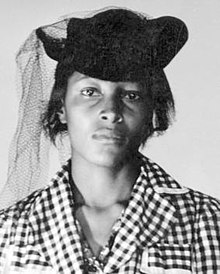Recy Taylor | |
|---|---|
 Mrs. Recy Taylor in 1944 | |
| Born | Recy Corbitt December 31, 1919 Abbeville, Alabama, U.S. |
| Died | December 28, 2017 (aged 97) Abbeville, Alabama, U.S. |
| Occupation | Sharecropper[1] |
Recy Taylor (née Corbitt; December 31, 1919 – December 28, 2017)[2]: 297 was an African-American woman from Abbeville in Henry County, Alabama. She was born and raised in a sharecropping family in the Jim Crow era Southern United States. In the 1940s, Taylor's refusal to remain silent about her rape by white men led to organizing in the African-American community for justice and civil rights.
On September 3, 1944, Taylor was kidnapped while leaving church and gang-raped by six white men.[2]: xv–xvii [3][4] Despite the men's confessions to authorities, two grand juries subsequently declined to indict the men; no charges were ever brought against her assailants.[5]
In 2011, the Alabama Legislature officially apologized on behalf of the state "for its failure to prosecute her attackers." Taylor's rape, refusal to remain silent, and the subsequent court cases were among the early instances of nationwide protest and activism among the African-American community and ended up providing an organizational spark in the civil rights movement.[2]: 39
At the 2018 Golden Globe Awards, while accepting the Cecil B. DeMille Award, Oprah Winfrey discussed and brought awareness to Taylor's story, a few weeks after her death and in light of the MeToo movement.[6] The Congressional Black Caucus led Democratic Caucus members in wearing red "Recy" pins while attending the 2018 State of the Union, where Taylor's granddaughter, Mary Joyce Owens, was a guest.[7]
- ^ McGuire, Danielle L. (December 6, 2010). "Rosa Parks' political journey didn't begin on the bus". The Grio.
- ^ a b c McGuire, Danielle L. (2010). At the Dark End of the Street: Black Women, Rape, and Resistance—A New History of the Civil Rights Movement from Rosa Parks to the Rise of Black Power. Random House. ISBN 978-0-307-26906-5.
- ^ Chan, Sewell (December 29, 2017). "Recy Taylor, Who Fought for Justice After a 1944 Rape, Dies at 97". New York Times. Retrieved December 30, 2017.
- ^ "Recy Taylor". National Women's History Museum. Retrieved July 12, 2020.
- ^ Chan, Sewell (December 29, 2017). "Recy Taylor, Who Fought for Justice After a 1944 Rape, Dies at 97". The New York Times. ISSN 0362-4331. Retrieved July 12, 2020.
- ^ Vincent, Alice (2018). "Recy Taylor: the woman whose rape inspired Rosa Parks in 1944, and is inspiring Oprah Winfrey today". The Telegraph. ISSN 0307-1235. Retrieved January 8, 2018.
- ^ "'She spoke up': Lawmakers wear 'Recy' pins in honor of Recy Taylor". Nbcnews.com. January 31, 2018. Retrieved January 31, 2018.